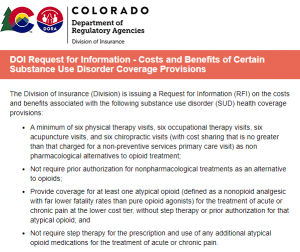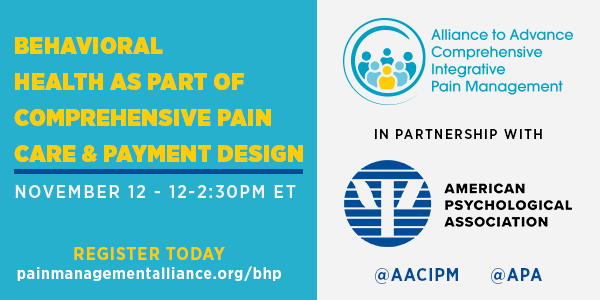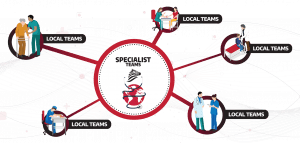Canadian and U.S. Veterans’ Leading Experts Unite for New Series About Chronic Pain Best Practices
We are excited to announce that registration is open for this inaugural symposium hosted by the Chronic Pain Centre of Excellence for Canadian Veterans (CPCoE) in collaboration with leading experts from the United States Department of Veterans Affairs (VA) and United States Department of Defense (DoD).
AACIPM is promoting the dissemination of this symposium in the United States and encourage all stakeholders to share this high-quality, free resource with your networks (see link below).
The Veteran and Family Well-Being Series will be held virtually this fall (November 18 & 25 and December 2 & 9). The aim of the series is to provide education on the evolution of pain management and current best practices in evidence-based interdisciplinary care. Targeting a broad audience of Veterans, case managers, and health care professionals, the series will showcase the shared priorities in both countries’ care of Veterans.

CO Public Meeting with Insurance Commissioner Held on 10.21.20
AACIPM collaborated with stakeholders in support of CO House Bill 20-1085.
 “When patients are able to receive the types of care proposed in HB 20-1085, physical therapy, occupational therapy, chiropractic and acupuncture, they improve faster and the costs associated with their care go down,” said Amy Goldstein, Director, AACIPM during the public meeting. Furthermore, “in a review of Colorado insurance claims from 2018, Oliver Wyman found that 13% of patients treated for pain incurred over $2,500 per person in pain-related claims that year, and that these individuals had roughly eight times the healthcare costs of all remaining insured members.”
“When patients are able to receive the types of care proposed in HB 20-1085, physical therapy, occupational therapy, chiropractic and acupuncture, they improve faster and the costs associated with their care go down,” said Amy Goldstein, Director, AACIPM during the public meeting. Furthermore, “in a review of Colorado insurance claims from 2018, Oliver Wyman found that 13% of patients treated for pain incurred over $2,500 per person in pain-related claims that year, and that these individuals had roughly eight times the healthcare costs of all remaining insured members.”
In 2018, Colorado passed legislation to establish a study committee related to opioid and other substance use disorders, and in 2019 that committee released a final report in which they formally recommended adoption of the bill that would ultimately become HB 20-1085. In 2020, that bill made it all the way to the Governor’s desk before being vetoed. The Governor has requested this RFI process to explore the impact of this bill on insurance premiums.
Behavioral Health as Part of Comprehensive Pain Care and Payment Design for People with Pain
Registration is open for AACIPM’s Fall Symposium on November 12 from 12:00-2:30 ET! Join us for this free event. This 2.5-hour symposium is hosted by the Alliance to Advance Comprehensive Integrative Pain Management in partnership with the American Psychological Association. The program will examine behavioral health as part of a comprehensive approach to pain management from the perspectives of providers, people with pain, payors and purchasers of healthcare.

Summary, Transcripts from Equity Symposium
Some important take-aways from the robust discussions among public and private payors, providers, people with pain, and non-governmental leaders during AACIPM’s recent symposium, Equity in Access to Comprehensive Pain Management for People with Pain:
- Conservative, evidence-based treatments are widely recommended as first-line, preferred by people living with pain, can prove less costly – yet access and utilization is exceedingly difficult for people who are underserved.
- Zip code matters more than genetic code
- Levers for change are integral – real examples of “Innovation & Demonstration” matter
- ECHO moves knowledge, not people, and supports a multimodal approach to pain management
We must continue to connect the dots to advance the integration of these evidence-based therapies throughout our healthcare systems.
Spotlight on ECHO
An interview with Dr. Joanna Katzman on ECHO

Joanna G. Katzman, MD, MSPH Professor, UNM School of Medicine Director, UNM Pain Center Director, ECHO Institute, Pain, Substance Use and Public Health Programs
“The biggest challenge in bringing many disciplines together in one space to work closely in support of caring for patients with high impact pain has been understanding how to share a common language around each clinicians’ discipline. In addition, it is vital to have all members of the team feel equally as valued as each other.”
“ECHO is extremely supportive of a multimodal approach to pain management. Much of our year-long didactic curriculum is focused on non-pharmacological approaches to chronic pain management. Because the ECHO sessions use Zoom as their platform, we are able to showcase many of these integrative approaches to pain management during an ECHO Pain session. These “hands-on” sessions are very popular among spoke clinicians and are requested year after year,” said Joanna G. Katzman, MD, MSPH, Professor, UNM School of Medicine; Director, UNM Pain Center; Director, ECHO Institute, Pain, Substance Use and Public Health Programs
Example of ECHO in Action for People with Rare Diseases
 The RDLA (Rare Disease Legislative Advocates) train their advocates to deliver the message that “Of the more than 7,000 known rare diseases and disorders, most of them have a pain component.” Specialist clinicians and resources are centralized in different areas – New York, Tokyo, Paris, Sydney – while the people living with rare diseases are distributed around the globe without local access to diagnostics, treatment or management of these conditions.
The RDLA (Rare Disease Legislative Advocates) train their advocates to deliver the message that “Of the more than 7,000 known rare diseases and disorders, most of them have a pain component.” Specialist clinicians and resources are centralized in different areas – New York, Tokyo, Paris, Sydney – while the people living with rare diseases are distributed around the globe without local access to diagnostics, treatment or management of these conditions.
The Ehlers-Danlos Society started the EDS ECHO® program with two hubs, one at Indiana University Health, Indianapolis, IN, USA, and the other at The Royal Society of Medicine, London, UK. Over time, their aim is to open hubs all over the world.
Message from the Director
 As another busy month draws to a close, I am reflecting on the importance of thoughtful and intentional collaboration around shared priorities. Keeping people with pain at the center of our work helps to guide our priorities and always allows us to find meaningful connections.
As another busy month draws to a close, I am reflecting on the importance of thoughtful and intentional collaboration around shared priorities. Keeping people with pain at the center of our work helps to guide our priorities and always allows us to find meaningful connections.
I am excited about sharing the new symposium that connects Canadian and US Veterans’ leading experts around their shared priorities for how to care for Veterans (details above). I am also motivated by the public meeting in Colorado around HB 20-1085 (details above), which forged clear alignment from stakeholders with a focus on access to the right care for people with pain and substance use disorder.
I am grateful to all of our collaborators and partners and our shared priorities to advance access and utilization of person-centered pain management.
Onward and Upward!
Amy
Relevant Reading
![]() Americans with Lower Education Levels Suffer More Pain than People with More Education, MedicalXpress, October 29
Americans with Lower Education Levels Suffer More Pain than People with More Education, MedicalXpress, October 29
From Comprehensive Care to Finding Cures, Fighting Sickle Cell Disease, Stanford Children’s Health, October 27
Acupuncture University Research Discoveries, HealthCMi, October 27
Yoga and Meditation Reduce Chronic Pain, The Washington Newsday, October 27
Migraine Foundation Recommends Acupuncture Treatment Plan, Murfreesboro Post, October 25
University Hospitals Connor Integrative Health Network to Study Acupuncture in the ED with $2+ Million Grant, Newswise, October 22
Acupuncture Stops Pain Finding At Tufts University, HealthCMi, October 20
Why Telemedicine May Actually Be Making Healthcare More Human, Salon, October 11
6 Ways to Handle the Stigma of Chronic Pain and Illness, Psychology Today, October 9
‘Devastating’ Cut to Reimbursement Causes Concern at Physical Therapy Clinics, Telegraph Herald, October 8
The Transition from Acute to Chronic Pain: Dynamic Epigenetic Reprogramming of the Mouse Prefrontal Cortex up to 1 Year after Nerve Injury, Pain, October 6
Telehealth More Time- and Cost-Effective for Chronic Pain Patients, Bolstering Case for Provider Adoption, Healthcare Finance, October 5
Mindfulness-Based Stress Reduction in the Management of Chronic Pain and Its Comorbid Depression, The Journal of the AOE, September 30
How Can Behavioral Health Consultants Encourage Patient Engagement in Brief Cognitive Behavioral Therapy for Pain?, PHCoE, September 30
Feedback
We welcome your input! What do you like? Do you have a contribution for an upcoming newsletter? Send us your comments, suggestions, or contributions.